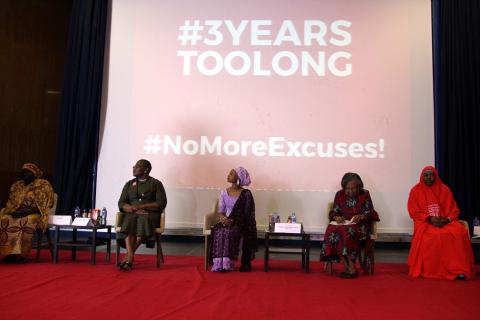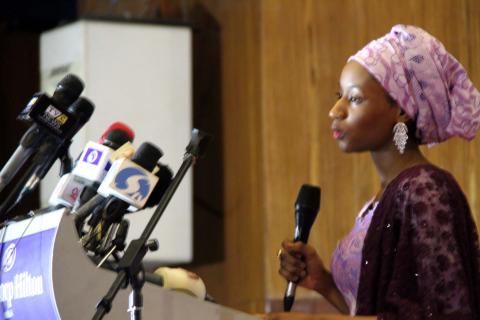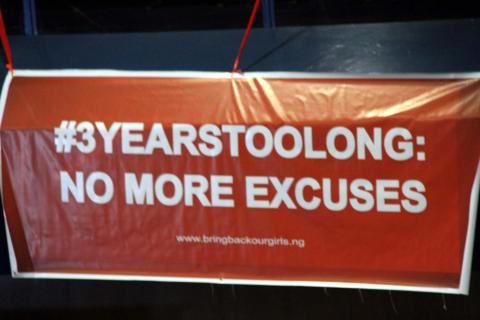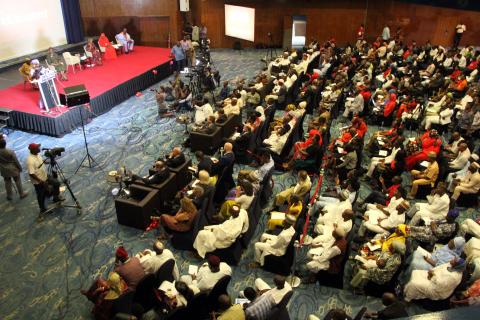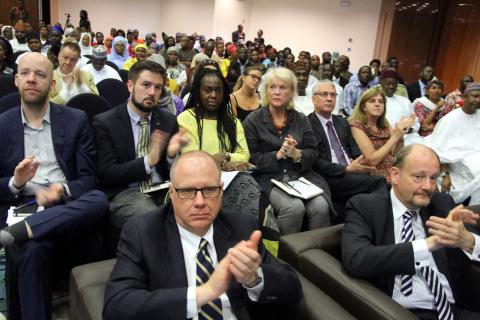
The Kano monarch advised the group to transform itself from one defined by the narrow focus on an incident to one that addresses the broader social reality of African women, and particularly women in Nigeria, especially the North.
The Emir of Kano, Alhaji Sanusi Lamido Sanusi, has commended the Bring Back Our Girls (BBOG) movement for keeping alive the campaign to rescue over 200 schoolgirls abducted in 2014 by Boko Haram in Chibok, Borno
The Kano monarch, however, advised the group to transform itself from one defined by the narrow focus on an incident to one that addresses the broader social reality of African women, and particularly women in Nigeria, especially the North.
The Emir offered the advice in a speech he delivered on Friday April 14th at the inaugural Annual Chibok Girls Lecture held at Yar’adua Center, Abuja. The event marks the third anniversary of the abduction of the girls.
"Let me begin by congratulating my sister and friend, Oby Ezekwesili, and all the other sisters and brothers in BBOG who have kept this issue alive and remain committed until we see all the girls back,” Sanusi said. “As we remember the girls captured in Chibok three years ago, we must remember that they constitute only a fraction of the victims of this insurgency. I would urge BBOG, while you keep this issue of Chibok on the table, to broaden your message to cover all girls and boys abducted by Boko Haram and also draw attention to the condition of girls and women in our society in general.”
The Kano Emir explained the problem created by abductions is grave and far-reaching.
"Today, in Dalori 2 IDP camps near Maiduguri alone, there are over 1,500 Boko Haram-abducted girls who are either pregnant or carrying babies, who have been freed by the military. Hundreds of orphaned children are being carried away to unknown destinations and they are all gone into oblivion due to society’s neglect," he pointed out.
As such, Sanusi called on Nigerians to provide more broad-based support for the BBOG. This, he explained, will enable BBOG to use the dramatic case of the Chibok girls as a plank, but not the exclusive focus of its struggle.
The goal of the struggle, insisted Sanusi, is to bring back all abducted girls. He wondered what their fate would be if and when they returned to their homes.
"But after these girls are brought back, shall we ask ourselves as well: where are they being brought back to? What kind of society? How much better is the 'normal' environment we all take for granted than Boko Haram camps? These questions ultimately force us to face the reality that the kind of society we have created in fact is the root cause for the emergence of groups like Boko Haram and occurrences like the Chibok tragedy," he emphasized.
The Emir accused the elite of caring very little for women and other marginalized groups in the society.
Quoting reports of published research, Sanusi said over 70.8% of women in North-West are unable to read and write compared to 9.7% in the South-East zone. More than two thirds of 15-19 year-old girls in the North are unable read a single sentence compared to less than 10% in the South. In addition, he said in eight northern states, over 80% of the women are unable to read and write, and only 4% of females complete Secondary school in Northern Nigeria. Seventy-eight percent of adolescent girls are in marriages in the North West, 68% in the North East and 35% in the North-Central.
"Apart from the huge loss of productivity and incomes caused by the lack of focus in education, especially for girls, adolescent marriages have led to serious social and health outcomes," he said.
Sanusi said one Nigerian woman dies during childbirth every 10 minutes, with the North-East zone having a maternal mortality rate of over 1,500 per 100,000, more than five times the global average.
“I can go on and on,” he said. “These statistics are not flattering. And they speak to a truth that is inconvenient to most of us. But the culture of silence must end. We have a problem. In fact we have an existential crisis. And all of us in this country, politicians, intellectuals, Emirs and traditional rulers, religious leaders, businesses, NGOS have to come together to solve this. The real patriots in the North are those who are honest enough to accept this reality and insist on change.”
He warned that the consequences of ignoring the crisis are grave.
Children of educated mothers, he stated, are 50% more likely to survive beyond the age of five, and educated mothers are more likely to send their own children to school. He also stated that every extra year of education for the girl-child could increase her earning capacity by 10% adding that an infant born to a mother under 18 suffer from 60% higher risk of dying in the first year of their life when compared to infants born to a mothers aged 19 or older.
"Girls who become pregnant below the age of 15 in poor countries have double the risk of maternal death and obstetric fistula than older women. In addition, girls under age 15 are five times more likely to die from maternity related causes than women under 20. The statistics that are provided therefore represent the tragedy in the lives of real human beings. This problem is most severe in the North-West and North-East, but the North-Central zone also fares worse that the three zones in the south," he declared.
The traditional ruler repeated his assertion that the North-East and North-West are the poorest parts of the country.
The Oxford Poverty and Human Development Initiative and the UNDP in 2015, Sanusi said, published data on the incidence of poverty in Nigeria. The data, he added, showed that, on average, 46% of Nigerians are living in poverty.
"Although this average is in itself bad, it masks even more serious internal inequalities and incidences of extreme poverty by region and gender. So for example the South-West of Nigeria has less than 20% of its population living in poverty while the North-West has more that 80% of its population living in poverty. In the North-East the figure is 76.8%. Over 90% of the people in Yobe and Zamfara States are living in poverty compared to 8.5% in Lagos and around 11% in Osun and Anambra states," the Emir said.
The angry responses to his release of the data, said the Emir, are aimed at diverting attention from the issues raised. He equally stated that issues faced by women go beyond girl-child education, early marriage and poverty. Educated women, he explained, still have to deal with issues of equal opportunities in the work-place, and unwritten but no less real gender discrimination.
"As Governor of Central Bank and Chairman of the Bankers’ Committee, I forced the question of addressing the gendered work-place to the fore,” Sanusi said. “We officially adopted a policy of aiming for at least 50% of employees of banks and the CBN being female by 2014. Also to address glass ceilings we pushed for at least 40% of Senior Management in the CBN and banks, as well as 30% of the Board of Directors being female.”
